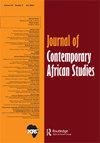Leadership and gender in Eswatini: Swati politics through the prism of Gelane Simelane Zwane, 1990–2018
IF 0.8
Q2 AREA STUDIES
引用次数: 0
Abstract
ABSTRACT This article examines the history of female leadership in contemporary Eswatini politics through the prism of Gelane Simelane Zwane as a neglected aspect of scholarship. Gelane Simelane Zwane doubled as the longest-serving female Chief of Kontshingila village and Senate President of Eswatini in recent history. This article is premised on the fact that Zwane’s leadership odyssey was shaped by the intersection of gender and culture. A qualitative methodology, involving the use of newspapers, court documents, in-depth interviews and focus group discussions, was employed in this study. The study reveals that, within the context of a patriarchal society, Zwane was able to shatter the ‘glass ceiling’ and attain political prominence in Eswatini. Consequently, she became an easy target for attacks in her enviable leadership positions that were traditionally occupied by males. She successfully navigated the slippery patriarchal terrain for decades until she was finally neutralised in a labyrinth of intractable Eswatini culture and tradition following the death of her husband in 2018.斯瓦蒂尼的领导与性别:格莱内·西梅拉内·兹瓦内视角下的斯瓦蒂政治,1990-2018
本文通过兹瓦内(Gelane Simelane Zwane)这一被忽视的学术视角,考察当代斯瓦蒂尼政治中女性领导的历史。Gelane Simelane Zwane是近代史上任职时间最长的Kontshingila村女酋长和斯瓦蒂尼参议院主席。这篇文章的前提是,兹瓦内的领导之旅是由性别和文化的交集塑造的。本研究采用了一种定性方法,包括使用报纸、法庭文件、深入访谈和焦点小组讨论。研究表明,在父权社会的背景下,兹瓦尼能够打破“玻璃天花板”,在斯瓦蒂尼获得政治声望。因此,在传统上由男性占据的令人羡慕的领导地位上,她很容易成为攻击的目标。几十年来,她成功地驾驭了滑头的父权地形,直到2018年丈夫去世后,她终于在棘手的斯瓦蒂尼文化和传统的迷宫中被中性化。
本文章由计算机程序翻译,如有差异,请以英文原文为准。
求助全文
约1分钟内获得全文
求助全文
来源期刊

Journal of Contemporary African Studies
AREA STUDIES-
CiteScore
2.20
自引率
0.00%
发文量
18
期刊介绍:
Journal of Contemporary African Studies (JCAS) is an interdisciplinary journal seeking to promote an African-centred scholarly understanding of societies on the continent and their location within the global political economy. Its scope extends across a wide range of social science and humanities disciplines with topics covered including, but not limited to, culture, development, education, environmental questions, gender, government, labour, land, leadership, political economy politics, social movements, sociology of knowledge and welfare. JCAS welcomes contributions reviewing general trends in the academic literature with a specific focus on debates and developments in Africa as part of a broader aim of contributing towards the development of viable communities of African scholarship. The journal publishes original research articles, book reviews, notes from the field, debates, research reports and occasional review essays. It also publishes special issues and welcomes proposals for new topics. JCAS is published four times a year, in January, April, July and October.
 求助内容:
求助内容: 应助结果提醒方式:
应助结果提醒方式:


